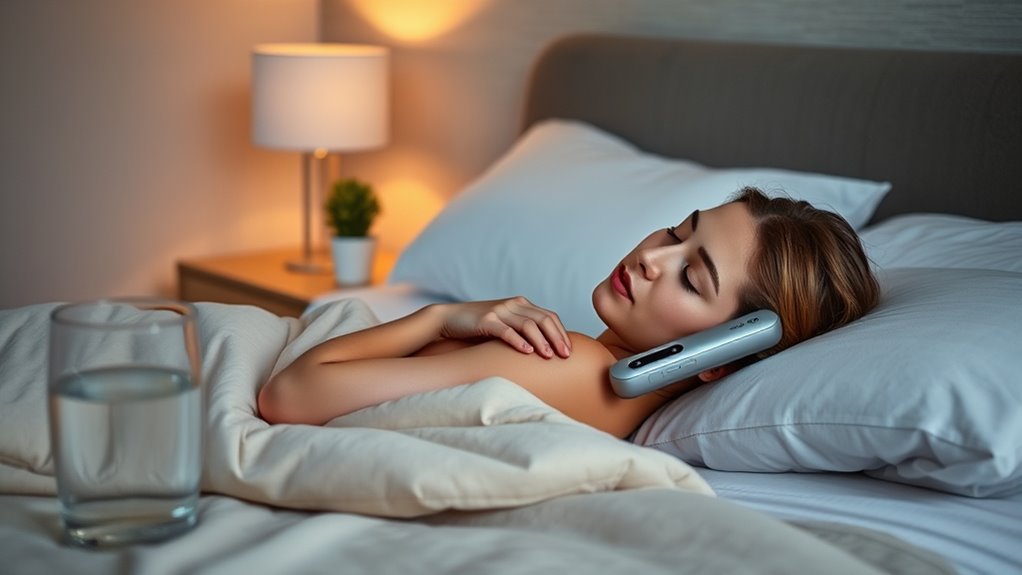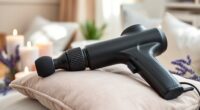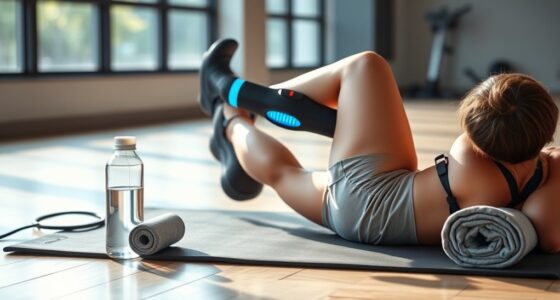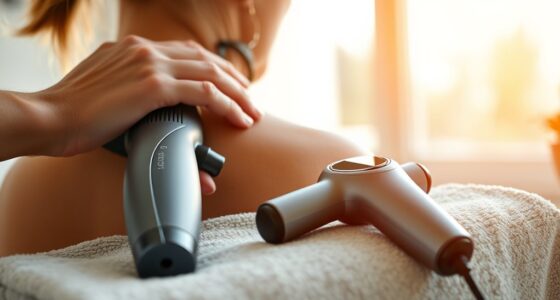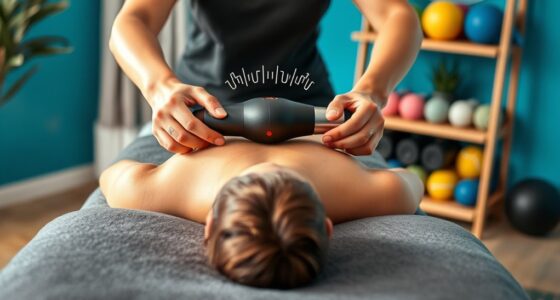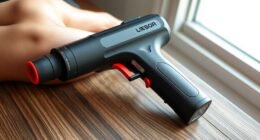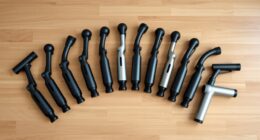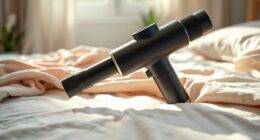Percussive therapy can help improve your sleep by relaxing muscles and reducing tension before bed. It promotes muscle relaxation, eases muscle knots, and lowers stress hormones, making it easier to fall asleep and enjoy deeper rest. Using targeted pulses for just a few minutes can create a calming routine that prepares your body for sleep. Keep exploring how this simple technique may transform your nighttime recovery and improve overall sleep quality.
Key Takeaways
- Percussive therapy promotes muscle relaxation and reduces tension, facilitating faster sleep onset.
- It triggers relaxation responses by easing muscle tightness and lowering stress hormones.
- Using targeted pulses helps loosen muscles, creating a calming routine before bedtime.
- Regular application can lead to deeper, more restorative sleep throughout the night.
- It is a natural, non-invasive method that supports improved sleep quality and nighttime recovery.
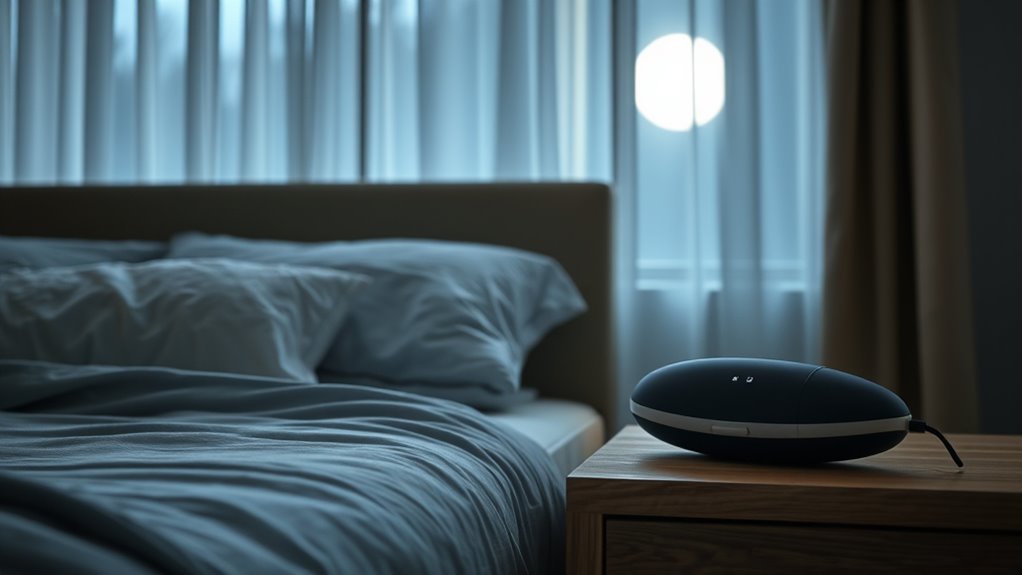
Have you ever wondered if percussive therapy could help you sleep better? It’s a question many people ask when searching for natural ways to improve their rest. Percussive therapy involves using a device that delivers rapid, targeted pulses to muscles, and it’s gaining popularity for its ability to promote muscle relaxation. When your muscles relax more easily, it can have a direct impact on your sleep quality, helping you fall asleep faster and enjoy deeper rest throughout the night.
Percussive therapy promotes muscle relaxation, helping you fall asleep faster and enjoy more restful nights.
The idea behind using percussive therapy before bed is straightforward. When you activate these devices on tense or sore muscles, they help break down knots and reduce muscle tension. This process encourages muscle relaxation, which is essential because tense muscles often make it harder to wind down at the end of the day. As your muscles loosen up, your nervous system signals that it’s time to relax, making it easier for your body to shift into sleep mode. Over time, regular use of percussive therapy can lead to a more relaxed state before bedtime, setting a foundation for improved sleep quality.
You might notice that after a session of percussive therapy, your body feels noticeably lighter and less stiff. This sensation of relief isn’t just temporary; it can help you establish a calming routine that signals your body it’s time to rest. When your muscles aren’t tight or sore, your breathing tends to slow down, and your heart rate decreases, both of which are conducive to better sleep. The relaxation response triggered by percussive therapy can also lower levels of stress hormones, further supporting a peaceful night’s sleep.
Incorporating percussive therapy into your evening routine doesn’t require much time or effort. A few minutes of targeted treatment on key muscle groups—such as your back, legs, or shoulders—can be enough to promote relaxation. It’s especially beneficial if you experience muscle discomfort after a long day, as reducing muscle tension helps prevent that discomfort from interfering with your sleep. When muscles are relaxed, you’re more likely to enter that restful state where sleep becomes deeper and more restorative.
Ultimately, the connection between muscle relaxation and sleep quality is clear. By using percussive therapy to ease muscle tension before bed, you create a more favorable environment for sleep. This simple addition to your nightly routine can help you fall asleep faster, stay asleep longer, and wake feeling more refreshed. If you’re seeking a natural way to improve your sleep, exploring how percussive therapy influences your nighttime recovery could be a valuable step toward better rest.
Frequently Asked Questions
Can Percussive Therapy Replace Traditional Sleep Aids?
You wonder if percussive therapy can replace traditional sleep aids. While it promotes muscle relaxation and stress reduction, it’s unlikely to fully substitute medications or other sleep techniques. Using percussive therapy can improve your overall sense of calm and ease muscle tension, helping you wind down naturally. However, for persistent sleep issues, combining it with other strategies or seeking medical advice is often more effective than relying solely on percussive therapy.
How Long Should I Use Percussive Therapy Before Sleep?
Imagine giving your muscles a gentle hug before bedtime. You should use percussive therapy for about 10-15 minutes, focusing on areas prone to tension. This helps promote muscle relaxation and stress relief, setting the stage for restful sleep. Keep it gentle and consistent, listening to your body’s signals. Overusing might lead to discomfort, so aim for a calming routine that prepares you for a peaceful night.
Are There Any Risks of Using Percussive Therapy Nightly?
Using percussive therapy nightly can pose risks like muscle fatigue and skin irritation if overused or applied incorrectly. You might experience soreness or discomfort, especially if you target the same areas repeatedly. To avoid these issues, limit your sessions, use proper technique, and listen to your body. If you notice persistent soreness or irritation, it’s best to consult a healthcare professional before continuing nightly use.
Does Percussive Therapy Benefit Insomnia or Sleep Disorders?
When it comes to sleep issues, you might find that percussive therapy can help you hit the hay more easily, but it’s not a cure-all. It promotes muscle relaxation, which can improve sleep hygiene, especially if muscle tension disrupts your rest. While some users report better sleep, scientific evidence is limited. Give it a try, but don’t forget to combine it with good sleep habits for the best shot at restful nights.
Can Percussive Therapy Improve Overall Sleep Quality Long-Term?
You wonder if percussive therapy can improve your overall sleep quality long-term. It promotes muscle relaxation and stress relief, which are key to better sleep. Regular use may help reduce muscle tension and calm your mind, leading to more restful nights. While results vary, consistent therapy could support your sleep health over time, making it easier to fall asleep and stay asleep longer.
Conclusion
Percussive therapy can be your gentle lighthouse, guiding your body toward restful shores after a long day. By easing muscle tension and promoting relaxation, it helps you sail smoothly into sleep’s calm harbor. While it’s not a magic wand, incorporating this recovery tool into your routine can illuminate a clearer path to nightly tranquility. Embrace it as part of your voyage to better sleep, and let your body drift into peaceful dreams with newfound ease.
